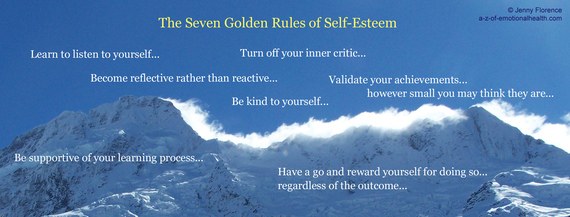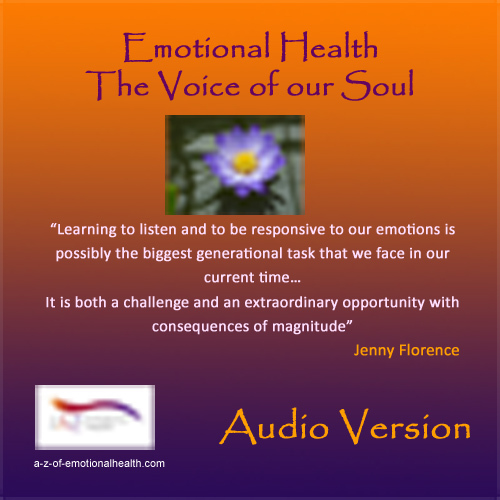
People often talk about confidence and self-esteem together, but they're actually very different. This doesn't mean that people who have good self-esteem won't be confident, or that people who are confident won't also have good self-esteem, but it's not always the case. Some people have very good self-esteem and yet lack in confidence whilst others are incredibly confident but have very low self-esteem, in fact if someone is extremely confident then low self-esteem can be very well hidden.
A good way to think about the difference is that self-esteem is an internal experience and confidence is an external experience. Let me explain what I mean. Self-esteem relates to the way that we feel about ourselves, it's a reflection of our inner sense of self value and entitlement, whereas confidence is a reflection of the way that we experience ourselves in our external world, in our relationships with other people and with situations and circumstances.
Confidence can be very specific. We can feel confident in some situations, yet not in others. We might feel confident in our working relationships and yet not in our closer, more intimate encounters; confident within certain social settings and yet not at all in others. Confidence is also something we can learn, like a skill, and the more we do, the more our confidence will grow. So for example, if I lack the confidence to cook, I could do a cookery course and overcome my difficulties but if my self-esteem is low, even if I became a confident cook and incredibly good at it, I might never acknowledge my achievement or place any value on it. Despite being confident the feel good factor is missing and my poor self-esteem will remain.
So confidence is the way that we feel about interacting and engaging with something external, whether it's talking and relating to others or doing something in our world; whereas self-esteem is a reflection of our own inner sense of self value, regardless of the external circumstances around us. Confidence can be learned and is very specific, we don't actually need to feel confident about everything and that's ok, but a lack of self-esteem can cause much greater difficulty in our lives.
If we lack confidence in any area of our life but our self-esteem is good it will act as a kind of a buffer, or a solid foundation. We will feel more resilient and more able to try something and regardless of the outcome still feel good about ourselves. We can have a go, fall over, get back up again and still feel good that we tried. However if we have bags of confidence but very low self-esteem then regardless of a successful outcome we very rarely feel good about our achievements.
People who have very low self-esteem are almost always ultra-critical of themselves, they have a raging inner critic and continually put themselves down, and even when they achieve something really quite significant, they never reward themselves. They never allow themselves to digest or own or celebrate the good experiences that they generate and create in their lives. And not only do they not reward themselves but they don't receive compliments easily either.
Self-value grows through true regard and respectful acknowledgement and recognition. Just think about the way children respond to positive feedback. Even if a child is encouraged to have a go and confidence is built, if achievement is never recognized and celebrated then the feel good factor will be missing and the outcome won't be internally consolidated.
If you recognize that you have low self-esteem here's a really useful exercise that you might find helpful.
Most people with low self-esteem have a notoriously active inner critic. They are frequently incredibly supportive of others and yet don't offer themselves the same level of support and regard. If this is you then try this... Learn to press a pause button. If your inner critic is a default position that you slide into easily then this may take a few practice runs. The key here is that if you do slip into a default position, it's really important not to then criticize yourself for doing this, be supportive of your learning process, and because people with low self-esteem very rarely reward themselves when you notice your inner critic and when you press the pause button, please validate and acknowledge yourself. This is an achievement and validation is crucial to the growth of our self-esteem.
So when you've pressed the pause button, notice what you would have said. Now imagine the impact of saying that to a child. For many people the things that they say to themselves would reduce a child to a place of absolute distress and despair within minutes and yet bizarrely we do this to ourselves all of the time!!
Now imagine you're with someone you care about, perhaps a close friend, or maybe a child. What would you say to them? Listen to yourself and respond to yourself with care and support. It's interesting that the things we say to someone else are very often a million miles away from what we might be say to ourselves. We need to learn to give ourselves the same level of support that we offer others.
So here are the seven golden rules of self-esteem:
Learn to listen to yourself...
Turn off your inner critic...
Become reflective rather than reactive...
Be kind to yourself...
Have a go and reward yourself for doing so, regardless of the outcome...
Be supportive of your learning process...
Validate your achievements, however small you may think they are...
Human beings are wonderfully complex... and learning to understand ourselves emotionally is absolutely at the core of our health and well-being.
The full version of this talk will be posted on Jenny's site, the a-z-of-emotionalhealth.com due to go live on 15th November. Jenny's new audio book, Emotional Health the Voice of Our Soul, has just been released. It is also available in Kindle.


